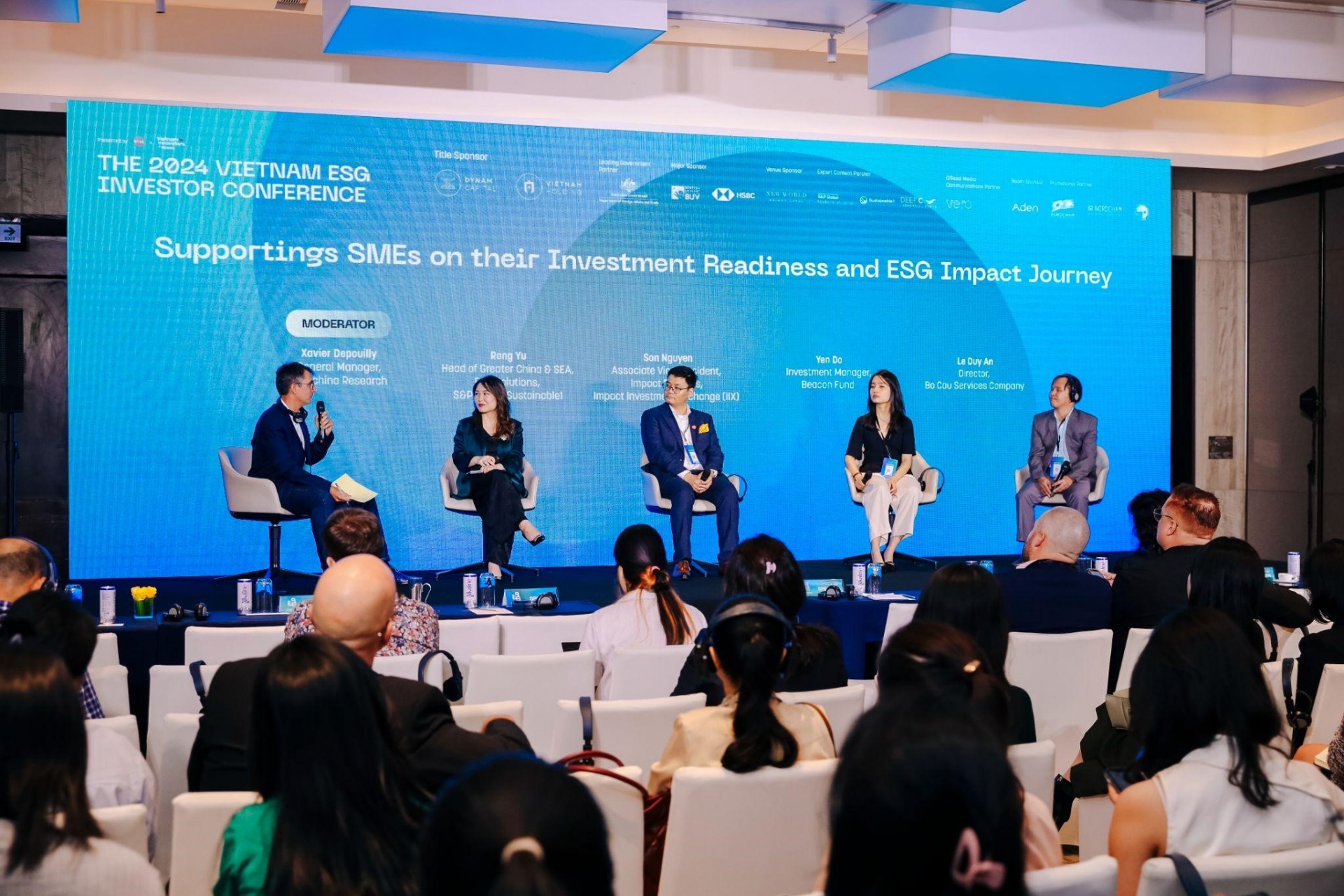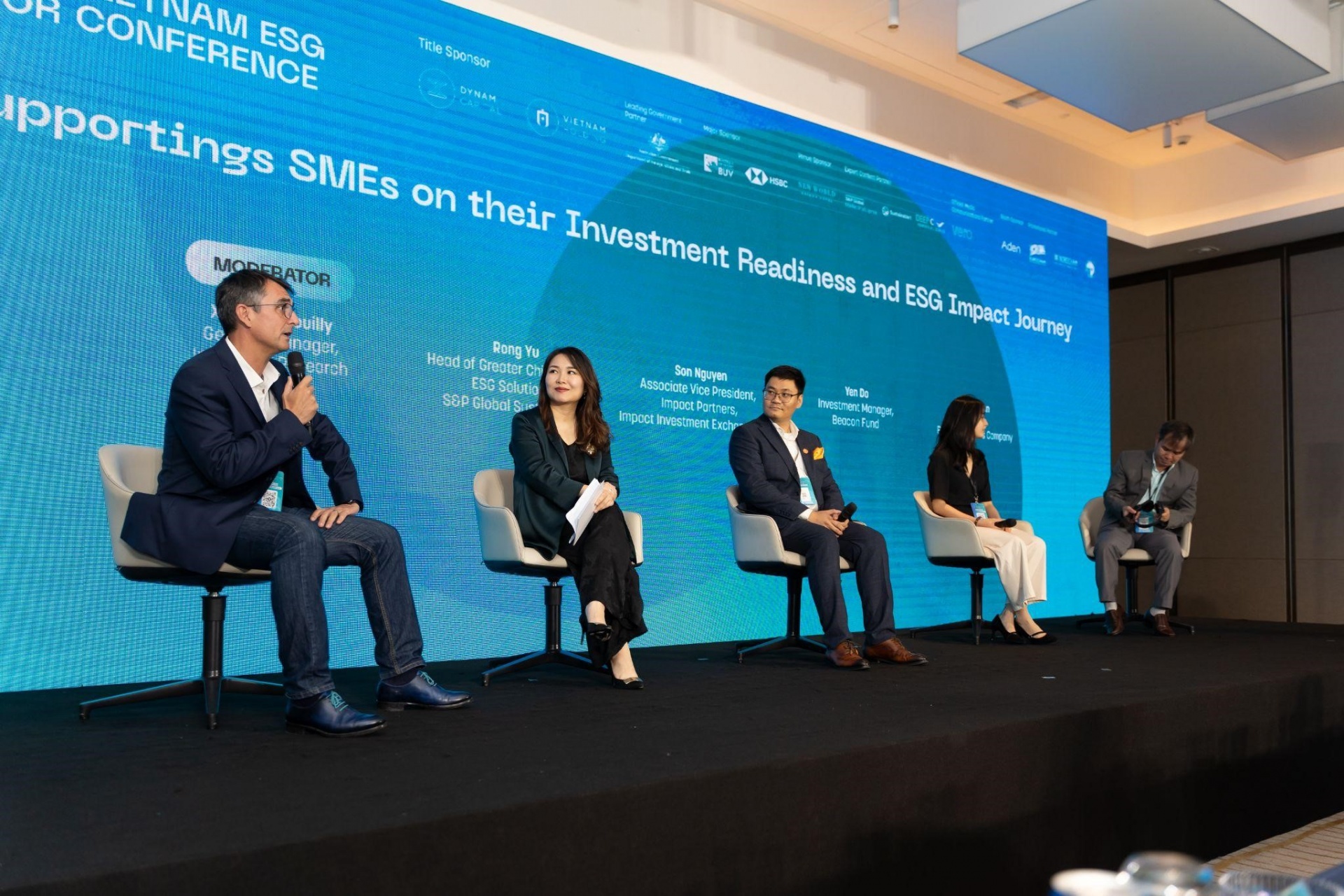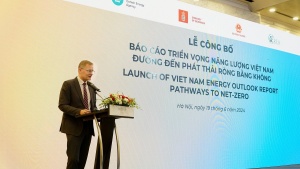Support for SMEs vital for ESG adoption
With a focus on building strong partnerships and resilient systems for sustainable finance and environmental, social, and governance investing, the 2024 Vietnam ESG Investor Conference was held in Ho Chi Minh City on May 16-17.
 |
The conference, organised by Raise Partners and Vietnam Innovators by Vietcetera, brought together experts from the public, private and academic spheres, as well as the media, to foster meaningful conversations on accelerating green and inclusive growth in Vietnam.
Among the key sessions at the conference was a panel discussion on supporting small- and medium-sized enterprises (SMEs) as they invest in ESG practices.
The session featured Rong Yu, head of ESG Solutions for ASEAN and Greater China at S&P Global Sustainable1, and provided valuable insights on how SMEs can avail of resources to become investment-ready and enhance their ESG performance.
During the panel discussion, moderated by Xavier Depouilly, general manager of Indochina Research, Rong was joined by other specialists including Son Nguyen, associate vice president at Impact Partners, Impact Investment Exchange; Yen Do, investment manager at Beacon Capital; and Le Duy An, director of Bo Cau Services Company.
 |
Rong Yu leads S&P Global Sustainable1’s ESG business in Mainland China, Hong Kong, Taiwan, and ASEAN markets.
Delivering sustainable solutions across asset classes for investors and corporates, Rong drives S&P Global’s continued expansion and leadership in Asian sustainable finance markets.
With over a decade of experience in sustainability and climate change, Rong has held various ESG-related roles at PwC Strategy, the World Bank, and the United Nations.
She is a regular speaker and respected commentator on ESG and sustainable finance issues.
The main takeaways from the discussion were:
The five steps to investment readiness for SMEs
First is understanding ESG and sustainability metrics. Along with this, SMEs must familiarise themselves with ESG and sustainability metrics, and reporting standards. This understanding will help them meet investor criteria and attract necessary funding.
Second is leveraging technological solutions, as technology is critical for managing and reporting ESG and sustainability impacts. SMEs should invest in technologies that enable effective tracking and reporting of their performance.
Third is building strong governance structures, as robust governance ensures accountability and transparency in ESG and sustainability practices. SMEs should establish clear governance structures to support sustainable growth.
Fourth is stakeholder engagement. That is because active engagement with stakeholders, including employees, customers, and the community, is crucial. This engagement builds trust and enhances the SME's ESG and sustainability profile.
The final step is accessing the various financial tools and resources available to support SMEs in their ESG and sustainability journey. These include grants, loans, and investment funds targeted at sustainable businesses.
The best practices for ESG and impact measurement
Set clear goals: SMEs should define clear, achievable ESG and sustainability impact goals that align with their mission and values. This clarity will help measure progress and demonstrates commitment to sustainability.
Regular reports: Consistent and transparent reporting on ESG and sustainability impact metrics is essential. This practice helps track progress and keeps investors and stakeholders informed.
Continuous improvement: ESG is a continuous journey. SMEs should regularly review and update their ESG and sustainability strategies to adapt to changing circumstances and emerging best practices.
S&P Global’s role in supporting SMEs
Throughout its history, the world's leading organisations have relied on S&P Global for essential intelligence to make decisions with confidence.
S&P Global Sustainable1, the business group dedicated to sustainability, matches customers with sustainability products, insights, and solutions from across S&P Global’s divisions to help meet their unique needs.
The comprehensive coverage of global markets, combined with in-depth sustainability intelligence, provides financial institutions, corporations, and governments with expansive insights on business risk, opportunity, and impact as they work towards a sustainable future.
Of the 865,000 enterprises operating in Vietnam, about 98 per cent are SMEs. These businesses form the backbone of the Vietnamese economy and play a critical role in the nation’s quest to build a resilient and sustainable future.
SMEs' contribution to the economy is significant, but their potential impact on ESG is equally important. To harness this potential, SMEs need to access the tools and resources necessary to secure financing and enhance their profiles as social and environmental impact businesses.
Supporting SMEs on their investment readiness and ESG impact journey is crucial for the sustainable development of Vietnam. With the right tools, resources, and strategies, SMEs can enhance their contribution to the economy while making a positive impact on the environment and society.
The 2024 Vietnam ESG Investor Conference provided a platform for these discussions, highlighting the importance of collaboration and innovation in driving sustainable growth.
 | ESG standards fit for the country As the world deals with an unpredictable global economic environment, applying environmental, social, and governance aspects into the everyday lives of individuals and business operations is now considered a vital approach that will help sustainable development across a wide range of enterprises, communities, fields, and industries. Here, experts and business leaders offer their say on how the ESG issue affects Vietnam in particular. |
 | Innovation props up ESG prospects Environmental, social, and governance policy is now a must-have and a major risk-reducing investment opportunity for modern businesses, according to experts. |
 | Investment in green energy transition vital for Vietnam The Vietnam Energy Outlook Report - Pathways to Net Zero (EOR-NZ) has noted that to achieve its 2050 target, Vietnam's CO2 emissions may peak by 2030, so the pace of its green energy transition needs to pick up. |
What the stars mean:
★ Poor ★ ★ Promising ★★★ Good ★★★★ Very good ★★★★★ Exceptional
Related Contents
Latest News
More News
- Agro-forestry and fisheries exports jump nearly 30 per cent in January (February 09, 2026 | 17:45)
- Canada trade minister to visit Vietnam and Singapore (February 09, 2026 | 17:37)
- New tax incentives to benefit startups and SMEs (February 09, 2026 | 17:27)
- Vietnam forest protection initiative launched (February 07, 2026 | 09:00)
- China buys $1.5bn of Vietnam farm produce in early 2026 (February 06, 2026 | 20:00)
- Vietnam-South Africa strategic partnership boosts business links (February 06, 2026 | 13:28)
- Mondelez Kinh Do renews the spirit of togetherness (February 06, 2026 | 09:35)
- Seafood exports rise in January (February 05, 2026 | 17:31)
- Accelerating digitalisation of air traffic services in Vietnam (February 05, 2026 | 17:30)
- Ekko raises $4.2 million to improve employee retention and financial wellbeing (February 05, 2026 | 17:28)

 Tag:
Tag:


























 Mobile Version
Mobile Version